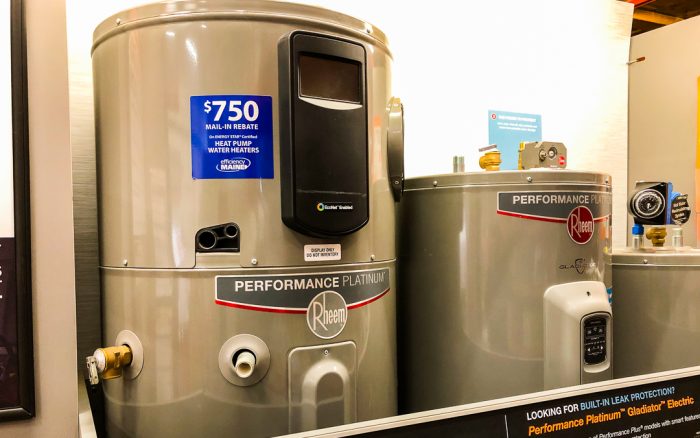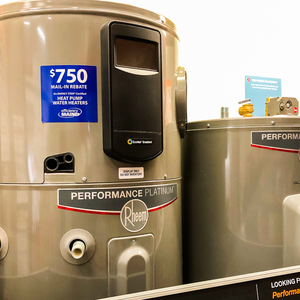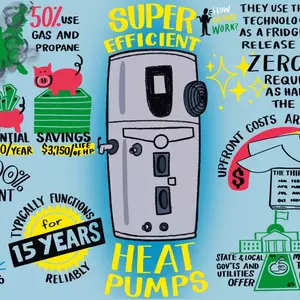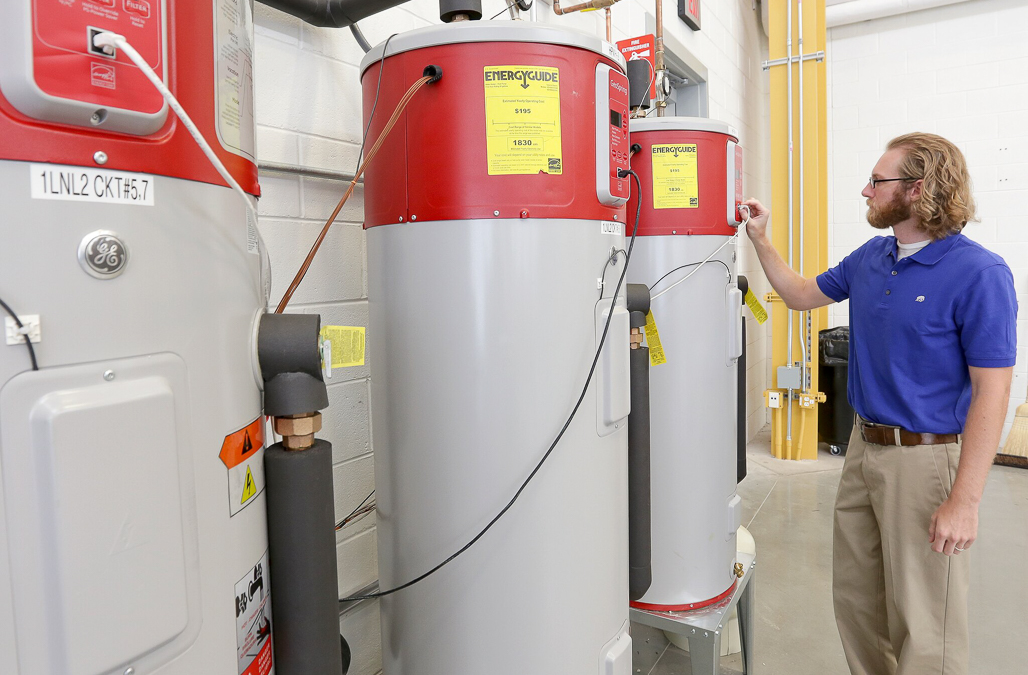
State and local leaders nationwide are beginning to recognize the importance of eliminating fossil fuels in newly constructed buildings. The rationale is clear: gas has an extremely limited place in our clean energy future, and it’s far more difficult, costly, and disruptive to swap out gas-consuming equipment from an existing building than it is to build without gas from the start.
However, this long-term view does little to sway the developers, contractors, and housing regulators accustomed to basing their decisions on one question: what does it cost? Advocates have long worked to provide a sufficient answer to this often-complex problem.
The challenge is particularly significant for heat-pump water heaters (HPWHs). These systems have been sold in the United States for over 40 years but have historically struggled to penetrate the market, leaving the industry with relatively few case studies, best practices, and expert practitioners to learn from.
But as technology continues to improve, gas rates increase, and renewable grid penetration bolsters the carbon benefit of electrification, HPWHs appear poised to take a massive leap in market growth. Over 30 municipalities in California and Massachusetts have already passed policies prohibiting or strongly disincentivizing gas water heaters in new buildings. In some cases, the only roadblock is the detailed cost data that developers and contractors need to come along for the ride.
Rocky Mountain Institute (RMI) is seeking to address this knowledge gap with Heat Pumps for Hot Water: Installed Costs in New Homes, an insight brief based on a comprehensive cost dataset for HPWH projects in both single-family and multifamily homes. The key takeaway: HPWHs are often cheaper to install than gas systems in new residential buildings, especially for projects with gas infrastructure connection challenges (e.g., urban infill projects) and those designing against a high-performance benchmark (including California’s Title 24 building code). Other projects can be brought to cost parity with the heat pump incentives increasingly made available by electric utilities and governing bodies promoting electrification measures to achieve their carbon goals, like the $1,500/unit rebate currently offered by BayREN.
The cost-benefit of these systems will only improve over time as design and installation best practices further reduce installed costs, technological progress and new grid services improve cost savings, and the grid gets cleaner.
What policymakers can do
Utilities, municipal governments, and other regulating bodies can do more to ensure that developers replace the gas water heating systems that they have installed for decades with cost-competitive and carbon-superior HPWHs.
Municipalities in many states have the power to adopt all-electric building policies today. Municipalities and other authorities can also aggressively incentivize HPWHs for the same reasons they should aggressively incentivize heat pump HVAC options. Entities offering incentives can also use tracking programs to collect and publicize more cost data and supplement the work laid out in Heat Pumps for Hot Water: Installed Costs in New Homes, like the program Silicon Valley Clean Energy currently administers for single family retrofits.
Municipalities without the authority or funding to pursue these measures can nonetheless promote progress simply by adjusting building permit processes to incentivize, or at least require the consideration of, HPWH design options. Proven methods include expedited processes and height or density bonuses for eligible buildings. Municipalities could also promote heat pump options at nearly zero cost simply by requiring a comprehensive cost comparison between gas and HPWH options as part of project planning for any multifamily construction project. A cost comparison that requires developers to consider typically externalized gas infrastructure connection costs can quickly reveal cost savings opportunities that they might not otherwise identify.
Relevant authorities can also support the deployment of HPWHs and other all-electric products by providing training, education, and technical assistance services to developers and contractors. These services, many of which can be offered virtually even during a global pandemic, can help contractors generate new business and minimize cost overruns and waste in design and installation while increasing the uptake of available incentives. Perhaps most importantly, these new business opportunities can form the basis of a workforce development program targeted at nascent women- and minority-owned businesses as part of a broader just energy transition. The Contractor Academy led by Emerald Cities Collaborative follows a similar model.
Next steps
Every new gas connection represents a missed opportunity to accelerate and simplify our clean energy transition. HPWH systems can serve as a keystone technology in this transition, giving us better-performing buildings, cleaner air, and an opportunity to create a bigger and more diverse workforce. RMI’s analysis shows that these benefits can come at little or no cost to project developers in new single-family and multifamily developments, which can serve as a proving ground that paves the way to making similar improvements in existing buildings.
Policymakers still must work to understand the cost-benefit of HPWH systems by marrying the installed costs detailed in RMI’s analysis with an operational cost-benefit analysis reflecting local gas and electric utility rates, grid emission projections, utility infrastructure needs, and climate. The results can determine just how aggressively to promote HPWHs over time and when to mandate their use in new construction.
The future of hot water is heat pumps. Read our insight brief and get your community up to speed today!
Michael Gartman is senior associate, buildings, at the Rocky Mountain Institute. This post originally appeared at RMI Outlet and is republished here with permission. ©2020 Rocky Mountain Institute.
Weekly Newsletter
Get building science and energy efficiency advice, plus special offers, in your inbox.















28 Comments
While I firmly believe in the value of a hot water heat pump and have one on order for my new house, everyone I've dealt with regarding this (plumber, plumbing store, vendor rep) has questioned my using one. I've found I've had to do a lot of education to all of them to explain my choice and while they aren't trying to talk me out of it, I don't think I've swayed any of them as to the value of using one. So I really think education and convincing the plumbing professionals out there as well is extremely important.
The other issue that isn’t often brought up is the noise they make. While it’s probably comparable to an on-demand gas model, it’s certainly more than a standard gas or electric model. While I have one—and love it—we still needed to look for a new location in the house. Simply swapping it out with the previous water heater which lived in a central utility closet would have been too noticeable. It’s something worth planning for, and educating people about, so as to avoid disappointment and ultimately long term adoption of this technology.
I had a company out to give me a quote for a heat pump water heater and they spent more time trying to convince me to put in driveway heating. The guy giving the quote was going on and on about how he was heating his driveway with a resistance electric water heater as if that was somehow a good thing.
"he was heating his driveway with a resistance electric water heater as if that was somehow a good thing." Might not be the sharpest tool in the shed.
Hi Calum,
Thanks! You gave me a laugh. I remembered being 10 years old (1965) and admiring the 'rich man's steep electric heated driveway'.
We decided against a HPWH solely because of the noise. In a small house, with no basement, there is no place to put one that we wouldn't hear it. I visited someone who had one and the noise was pretty bad.
We went with an ordinary resistance model. 80% of our annual electric power comes from rooftop solar, though.
I got mine in April 2019 and I love it. To be fair though I previously had an oil boiler for domestic hot water so I can't do a direct comparison to a regular electric water heater. As for plumbers and trades people in my experience they usually like to go with what they know and are familiar with. Part of this is just human nature but the other part is time is money and putting a regular water heater in they can do in their sleep. as for the noise factor I have it in a separate storage room so I don't even hear it when it's running unless I'm really close to the wall on the other side of it.
Did you insulate the room for sound, or is it a standard stick frame with drywall?
We are building in the near future and would like to go the heat pump way but have concerns about the noise. We would put it in the utility room in the basement, and I wouldn't mind doing some sound proofing if needed.
I wish they would make a "low boy" model HPWH. Shortest I can find is 60", which won't fit under my split level stair landing where the water heater lives. With Vermont rebates a HPWH is only $300 or so. Almost ready to cut/dig a hole in my slab to fit it!
I completely agree on that point. I would think the lack of a lowboy model at the moment likely has to do with sales volumes and market penetration, but it would be nice to have that option available (even as a drop-ship configuration).
I would love to buy one if it existed; we have a crawlspace with a dehumidifier and are in a cooling-dominated climate zone, so have the perfect conditions for a HPWH retrofit (except for vertical height).
I understand the noise issue but luckily am putting in a mechanical room away from the bedrooms and will probably soundproof the walls. Also an issue is the volume of the room for venting purposes. There is a little know way to vent the HPWH and I am doing that through the wall into an attached garage, which will actually help with climate controlling it.
We had one installed in our garage about a month ago, and the noise is hardly noticeable where it is. It also cools down the garage...a little bit.
For anybody with propane (we don't have natural gas service here) it should be a no-brainer. The new Rheem is about 5x more efficient than a standard gas or propane unit. And with the price of propane here (over $4.00/gallon), our TOU electric rate, and the ability to schedule the water heater, the payback isn't at all bad. Plus we are finally completely free from propane. Our bulk tank is scheduled for removal in a couple of weeks.
Hopefully I am just stating the obvious...
A heat pump is a heat PUMP. If it is installed in a heated space then it heats the water by cooling the heated space which requires more heating. Robbing Peter to pay Paul. The only way it makes sense is to have it in a garage, unheated basement, or exterior closet. Otherwise it is just a Rube Goldberg way to heat water with your home heating system.
Runesign, while you're correct that HPWHs use conditioned air as their heat source, it's not really a problem in most cases. See, "How much space heat do they steal" and the comments here: https://www.greenbuildingadvisor.com/article/heat-pump-water-heaters-come-of-age.
The problem is that the hpwh benefit is gone. Draw an ( steady state / energy balance ) envelope around the hpwh and the home heat source. You end up with the energy going into the home heater and the water going though the water heater with the resultant heating of the water. The efficiency of hpwh doesn't change the energy balance. ( For simplicity I ignore the electricity driving the hpwh)
So you are paying a premium for a more complicated ( lower reliability ) system that is pegged by the efficiency of the home heater.
Best case scenario - home heating is by heat pump so you get the efficiency boost. But electrical heat of fossil fuel, no benefit!
And now that I reread the article I see that they are focused on new construction and kinda push heat pump but they don't explicitly tie the hpwh benefit to it.
A lot of pitfalls here.
There has been a lot of discussion about this, on GBA and elsewhere. There is a slight reduction in overall energy use but you aren't heating your house 100% of the year, nor are you heating your water 100% of the time, so it's not as bad a penalty as you're making it out to be. Do what you want, I'm just relaying what people smarter than me have said.
If you are heating your home 75% of the year then your HPWH is robbing heat from your home for that same period of time. That wasn't free heat your HPWH gave you. In southern states where cooling is desirable 75% of the year, I think HPWHs are a perfect fit.
I believe there is a huge wisdom gap in where these units belong. I have seen builders put HPWHs in basement mechanical rooms where 1.) you'll never need A/C, and 2.) the room itself is too small to provide enough volume of air to efficiently extract heat.
Incidentally, the article mentioned the rising price of natural gas. I guess electricity rates will not rise? If anything, electricity will rise faster than gas. And as for the rebate fairy—you realize that she doesn't create money. She repeatedly takes it from you and others in small amounts to avoid notice.
In our case, the heat that our HPWH "steals" during the heating season is supplied by a ductless mini-split at one-half to one-third the cost of electric resistance or fuel oil. We're not heavy users of DHW, so much of this heat is ultimately given back to this conditioned space by way of our tank's standby losses.
And as mentioned here before, for the other six or so months of the year it provides us with "free" hot water to the extent that it offsets the runtime of our dehumidifier (if you have to run a dehumidifier to keep mould and mildew at bay, you might as well generate your DHW in the process).
The Rheem allows you to install a duct from the air discharge so you can route the cold air OUT of the space the water heater is in. Just another option if you don't want it putting out cold air during winter.
I have the Rheem heat pump and so far, so good, going on 3+ years. It's in an attached garage so in the summer it cools the garage a little and in the winter, after driving I pull the car up near the heater and open the cars hood for some supplemental heat source.
I did a test and put the water heater on "resistance" mode only and my electric bill climbed over $30 for that month. Then put it back on "heat pump" only mode and my bill dropped just over $30 for the following month. I paid $700 for mine, after rebates, as it had some cosmetic damage on it so HD reduced the price. At this point, it has paid itself off already.
I refused to install propane at my home (rural area). It's 100% electric, so it's heat pumps everywhere (mini-split for AC/heat, mini-split for clothes dryer, mini-split for water heater). Love it and don't have to worry about CO emissions and dealing with propane deliveries.
Almost bought a heat pump water heater. Spent a lot of time working out how to install it. But over and over I read that the units are not reliable. Ecologically it makes no sense to save a little energy then replace the whole unit and dump the old one in a landfill. Solar electric plus resistive heater makes more sense.
Our Nyle Geyser RO is in its eleventh year of service and has performed flawlessly. The build quality is such that I expect it to soldier on for another ten years or more.
One of the nice things about the Nyle is that it's a stand-alone unit that works with your existing water heater or storage tank. Thus, if you have to replace your tank, you don't need to chuck-out the heat pump component as well (our SuperStor Ultra has a stainless steel liner and will probably outlive me). The fact that it plugs into a standard 120-volt wall outlet is another plus for us; without that, we would still be burning fuel oil to heat our water.
On the flip side, integrated tanks have a smaller footprint, and that can tip the balance in their favour if space is tight.
John, it all depends on your individual situation. The new Rheem units come with a "limited" 10 year warranty. What's the normal lifetime of a gas or standard electric water heater? If you are at the point of replacing your current water heater, then the HP unit will save significant energy. They are about 4x as efficient as a standard electric model. If you have have lots of extra PV capacity then it probably won't matter but, otherwise, it could make a significant difference.
In my case, I calculated that my HP model would save about 80% of the energy cost over my propane unit. This is a very rough estimate, though, because I also have PV (about 7.5 kW) and a 10 kWh storage battery (probably going to add another 6 kWh). Also my TOU rate is $0.52/kWh between 4 pm and 9 pm in the summer but only $0.09/kWh from midnight until 6 am. So the ability to shift load using the battery and also the scheduling capability of the water heater gives me a lot of flexibility.
But a big factor for us was getting rid of the propane unit. When we moved into our home 20 years ago we had propane water heat, a propane furnace and a propane clothes dryer. We replaced the dryer with a HP unit a couple of years ago. We installed a high efficiency zoned HP HVAC system last year and now, with the HP water heater, we are off propane completely. The 300 gallon tank is only about 10 feet from our house (probably not to code today) and with increased fire risks here in Southern California, we consider it to be a hazard. So, no more combustion appliances. The tank goes in a couple weeks.
The only gas appliance we have left is the water heater, and we pay about $125 a year just to have gas hooked up to the house ($10.52/month), and a further $10/month or so for the actual gas. (There are only two of us at home, and we do most of the laundry on cold.) So I'm figuring, with our relatively cheap electricity, a heat pump water heater couldn't cost us significantly more to run, and might cost less. (Given that we don't spend that much now, though, making up the difference in upfront cost might take a while -- but we can eat that money for the sake of being done with gas.) The chief difficulty I've run into is that replacing a gas water heater with an electric one means coordinating both a plumber and an electrician, which is much more of a hassle (that's one of the reasons we ended up bailing on a HPWH four years ago and just putting in another gas one).
The case for the HEAT PUMP is obvious. But seems to be irrelevant to the City of New York. The issue for the City is not new construction, but the retrofitting of thousands of multi-family apartment buildings. Although this process must be familiar in Europe, I am unaware of any equipment on the American market for retrofitting existing heat and hot water systems in multi-family buildings.
Can anyone offer some illumination on this issue?
Or direct me to an appropriate discussion?
There are multiple ways to justify the retrofit of a HPWH. I encountered one which hasn't been raised here. Facing an imminent roof replacement (shingle -> metal), I realized that my 60-yo brick chimney required a restoration which would run well into 4 figures, while the roofer offered an addendum to his contract for $350 to remove the stack to below the roof line, simplifying the roofing job and eliminating a major leakage risk: the chimney flashing. Since the only remaining appliance venting into that chimney was the conventional gas water heater, getting rid of it was a no-brainer, even with cheap gas in Fracksylvania. By chance, I found a local HD with a $500 discount on the in-stock Rheem; combined with the $300 EnergyStar tax credit, the up-front net is barely more than that of Old Faithful (my gas WH) itself. Even if, at the end of the Rheem's life cycle, I'm not thrilled by its performance, I could replace it with a resistive WH (PV on roof) or condensing gas WH (under $1000) and still be ahead of the game, versus maintaining an atmospheric flue that's open 24/7, and that 1-ton pile of masonry looming over my roof.
What is realistic sizing for a family of 4? 50, 65, 80 gal? Various numbers have been posted. I'm looking for real world experiences.
It depends on your family’s water usage. I use a barbaric amount of water - even before Covid I washed my hands a neurotic amount. We’re a family of three - two adults, one toddler - who takes two adult showers and one toddler bath per day. 3 loads of laundry per week. We run the dishwasher every other day. We have the 65 gallon Rheem and we’ve never had to take it out of heat pump only mode, even when family is visiting and there are two more showers per day. Current average daily electric usage is 5.5 kWh. The unit is in a very leaky fieldstone foundation basement that I’m hoping to air seal soon, so that should cut down the electric usage in cold weather.....
Log in or create an account to post a comment.
Sign up Log in